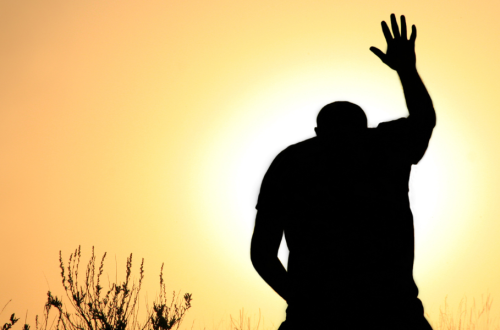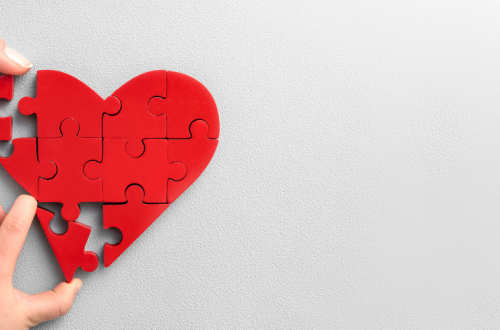
What makes you feel safe?
What makes you feel safe? Stop—before reading past this paragraph, I honestly want you to answer the question. When do you feel the safest? Is it when the savings account is at a certain level? When the teenagers are home and tucked into bed at night? When the annual doctor visit says all is well? What are the situations where you feel safe, like at that moment everything is fine and you can breathe in relief?
Have you answered? Okay, hold onto it a minute, because I want to share mine. I feel safest when I know nobody can show up at my door or I don’t have to go see people. This is shameful, but there it is. Rainy days, snowy days, days when the day planner is filled with nice, white, open spaces. Yes, I feel safe when no stressful human interactions are imminent or possible.
Flip it on its head
Back to your answer. You’re now thinking about what makes you feel safe. Flip it on its head. When that condition isn’t met—bank account is low, teenager misses curfew, doctor finds a problem, the week is filled with meetings—how do you feel? Do you panic? Are you irritable? Angry?
Got your answer to that one? You now have a safe scenario and your reaction to the unsafe scenario.
Except… Is it unsafe?
My pastor this week preached from Luke 12:13-32, which has two parts. First is a parable about a man who builds barns to store his wealth, and then he sits back and relaxes. God says, Wait, tonight you die. What good was all that hoarding? It’s a story about greed.
Right? Well, sure. Except… Jesus follows it up with this. “Therefore… do not worry.” This is a story about greed, but Jesus says no, it’s deeper. It’s a story about worry, and fear, and feeling unsafe. Jesus goes on to talk about ravens and lilies and how we don’t have to strive for food and clothes because God knows what we need. All we need to strive for, he says, is God.
So what you find safe, and by a flip what you consider unsafe, might be red flags to areas where you don’t trust, where you let fear and not Jesus dictate.
How can safety be bad?
Back to me. Let’s get concrete here. Mine is a little more obviously self-centered than some. I struggle with some social anxiety, so I feel better when I’m not faced with groups of people, only life has a lot of groups of people in it. What does God say about this? He says be united, bear burdens, don’t forsake gathering, love one another. Yeah. Hmm. Hiding out alone is not the best way to go about filling those commands.
You need to make a paycheck, watch out for your kids, protect your health, and all kinds of things, things that ensure safety and security for you and your family. And when poverty or danger or illness hit, it’s okay to grieve and deal with it. It isn’t grieving or working through those unsafe scenarios that cause you trouble; it’s when life is arranged around making sure they don’t happen that you might have fallen off the path.
When my drive for safety is draining away all my peace… Well, that doesn’t make sense, does it?
There is NOTHING wrong with feeling safe. The closer I am to God, the safer I feel in all scenarios. God wants me to feel peace and calm and joy and contentment. He’s all for that. But when I strive to avoid certain things to the point where my drive for safety is draining away all my peace… Well, that doesn’t make sense, does it?
Deeper Fears
Let’s take it a step deeper. What is it about people that scares me? Oh, this one makes me look so bad, but I am afraid of saying dumb things, doing dumb things, being embarrassed, not being liked, having no friends, and being alone.
Yes. You read that right. I hide from people to avoid being alone. And yes, I see how little sense it makes. I tell myself I’m bad with people and will mess up relationships regardless, so let’s just do it on my terms and start alone. That almost makes more sense, but not really. And rational me knows most of it is nonsense.

What is the deeper fear that drives your work ambition? Your overprotection of your children? Your healthy-at-all-costs decisions or any other quest for safety you’re on? And what do you lose in the striving? The man in the parable lost everything. What makes him feel safe doesn’t fix anything in his life.
Here’s what verses 18-21 have to say:
“Then he said, ‘This is what I’ll do. I will tear down my barns and build bigger ones, and there I will store my surplus grain. 19 And I’ll say to myself, “You have plenty of grain laid up for many years. Take life easy; eat, drink and be merry.”’ 20 “But God said to him, ‘You fool! This very night your life will be demanded from you. Then who will get what you have prepared for yourself?’ 21 “This is how it will be with whoever stores up things for themselves but is not rich toward God.”
Realize this is still a parable about greed. Nobody gets off the hook here for getting greedy. This is about his surplus grain, not what he needs to feed his family. This is about working too hard to secure his future and not looking around at the here and now. Maybe that grain could have fed friends and neighbors. Maybe it could have been stored for future community crises. He could have used the time and resources for any number of things that would have benefited God’s kingdom. But it’s also about why he found such comfort in being so greedy.
What do I trust?
But at its core, Jesus uses the parable to get down to the heart of it, which is trusting self versus trusting God. It’s about fearing God won’t come through and trying to control things ourselves.
I hoard my time and my very presence because I don’t trust God can overcome my fear or use me. That second one might be the deeper one. I don’t see that withholding myself from my community hurts my community. I mean, I get tongue-tied, say dumb things, don’t have that much to offer. Except maybe I do. If nothing else, I might have burdens others can carry, which allows them to honor God, or I might be one of those stranger body parts from 1 Corinthians 12:22-26:
On the contrary, those parts of the body that seem to be weaker are indispensable, 23 and the parts that we think are less honorable we treat with special honor. And the parts that are unpresentable are treated with special modesty, 24 while our presentable parts need no special treatment. But God has put the body together, giving greater honor to the parts that lacked it, 25 so that there should be no division in the body, but that its parts should have equal concern for each other. 26 If one part suffers, every part suffers with it; if one part is honored, every part rejoices with it.
I can’t honor others, and they can’t honor me, and we can’t be united and show the world who we are if I don’t show up. My safe scenario isn’t helping anyone but me, and it’s not helping me because I’m closing my eyes to some pretty clear directives from God in my pursuit of it.
Behavioral changes are easier when you know why you’re doing what you’re doing in the first place.
Dig a little deeper into your own issues today. There’s a huge list of what might scare you, what you might be striving to avoid, what worries are behind your less-than-honorable actions. Start with what makes you feel safe and work back to the deeper things. Drop them at God’s feet. Ask for more understanding of your own motivations, more love for God’s motivations and his kingdom, and forgiveness for trying to fix everything yourself and not involving God.
What about clinical anxiety?
I didn’t mention something here, and it’s important. I said social anxiety. That’s kind of a big deal. I don’t want you to hear me saying ignore your deeper issues. (Here’s a post about my thoughts on clinical anxiety that might be helpful.) Some fears and phobias are really hard to cope with, and I am not dismissing them. Never. But I think there are workarounds for many of them. For mine, I use this blog to reach out. Same with my fiction books. I try to see people one-on-one, which is more comfortable. I Skype a Bible study with my sister, because she’s comfortable and certainly worthy of my attention and love, and it’s good for both of us to share wisdom and experience.
But then, sometimes I have to go out and be in the groups. Digging down to find out your fears gives you the power to begin to deal with them. The man in the parable might not have realized his greed stemmed from fear of not having enough and his lack of trust in God, but if he’d known, maybe he could have changed his behavior. Repentance requires behavioral changes, and behavioral changes are easier when you know why you’re doing what you’re doing in the first place.
So dig and think and pray and ask friends what they think might be driving some of your fears and quests for safety, and then ask God to calm your fears or give you workarounds or otherwise mold you into what He wants you to be.
So, what makes you feel safe?
Feel safe, friends. Be calm and at peace. But know that true safety doesn’t come from a full barn or sleeping children or a hefty retirement account. Real safety isn’t a goal but a side effect, and if your life is all about making yourself feel safe, you’ve missed the mark. True safety comes from a deep, attached relationship with the God who fills barns and feeds birds and already knows and cares about what scares you and would love to walk you through those burdens to the other side.
(Note: This post was born while listening to a sermon preached by Rev. Rick Durrance at Wilmore Anglican Church on July 31, 2022. The sermon itself can be found on the church’s Facebook page. Thank you, Rick, for the timely words.)





2 Comments
Pingback:
Pingback: